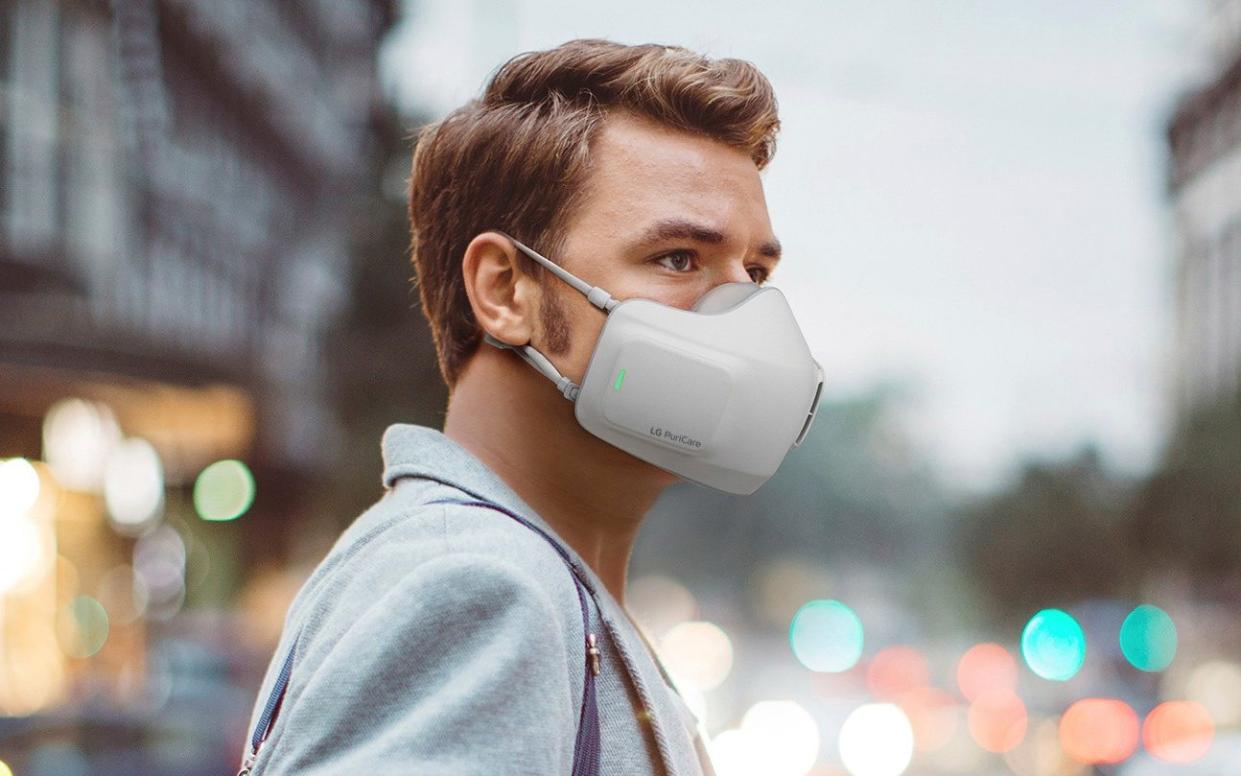Tech firm makes breathable mask that gives 'personal' filtered air supply

By Julian Ryall in Tokyo and Colin Freeman
A technology firm has invented a battery-powered face mask fitted with mini-air conditioning units to give users their own personal supply of filtered air, making it easier to breathe.
Fitted with gadgets developed for home air purifiers, the mask has miniature electronic fans to regulate the air flow, tackling a frequent complaint about regular masks. It also has filters to prevent the user breathing in infected droplets, making it potentially effective for those needing Covid-19 protection while working in crowded environments.
The fans have sensors to detect how vigourously the user is inhaling or exhaling, and can regulate their speed accordingly so that breathing is "effortless", according to the manufacturers, South Korean tech giant LG Electronics. It also allows users to wear spectacles without exhaled air steaming their glasses up.
The mask, described by LG as a "personal air solution", is due to go on sale later this year. No price has been set for it yet, although experts believe that in order to be commercially viable, it will have to cost no more than a couple of hundred pounds at most.
“The PuriCare Wearable Air Purifier is designed to deliver meaningful health and hygiene benefits,” said Dan Song, president of LG Electronics Home Appliance & Air Solution Company. “At a time when consumers are seeking ways to make life safer and more convenient, it’s important that we’re able to offer solutions that add measureable value.”
LG teamed up with Korea University to design the shape of the mask to ensure that it fits the face tightly. It is equipped with two HEPA (high-efficiency particulate air) filters designed to drop potentially infectious droplets either being inhaled or exhaled. It weighs roughly the same as a pair of ski goggles, and has lightweight batteries that offer up to eight hours of operation, depending on how vigorously the user breathes.
A special hygienic carrying case has UV-LED lights to help kill harmful germs and a mask charger, which can also sound an alarm when the filters need replacing. The mask is in part a miniaturised version of existing electronic breathing masks, which tend to be used only by doctors and scientists working in hazardous environments.
Some experts said they doubted it was necessary for general public use, although others said it might help those working in shops or frontline services.
"Most of the time we don't need that kind of protection, but if you were a tour bus guide, for example, working in crowded conditions with lots of unmasked people, you potentially consider this kind of device," said Dr Julian Tang, Honorary Associate Professor in Respiratory Sciences at Leicester University.
He said similar technology was already being used in biohazard suits. "LG just appear to have designed a more ergonomic version which looks more attractive and user friendly. The technology is not that new - perhaps they have miniaturised it more though."
In an article in US business magazine Fast Company, technology writer Mark Wilson said: "It’s hard to know if the mask will still feel hot, and just how much breathing assistance the low-level fan speed offers will be key to comfort. In any case, the whole idea reminds me a lot of an assistive pedaling e-bike, but for your face."
Dr Bharat Pankhania, an infectious disease expert at the University of Exeter's Medical School, added that it would be essential that the mask's exit valves were fitted with HEPA filters. Otherwise droplets could simply be expelled in concentrated form, putting other members of the public at risk. "I would be surprised if it could cope with someone breathing out, but that will be down to the filters," he said.
"Also, if you want an ordinary face mask that avoids your breath steaming up your glasses, it's just a question of adjusting it so that the exhaled air doesn't escape out the top.
"For the majority of the world's population, I would say it is much more sensible to wear a standard face mask as recommended by the World Health Organisation - they are cheap, effective and what people can afford."

